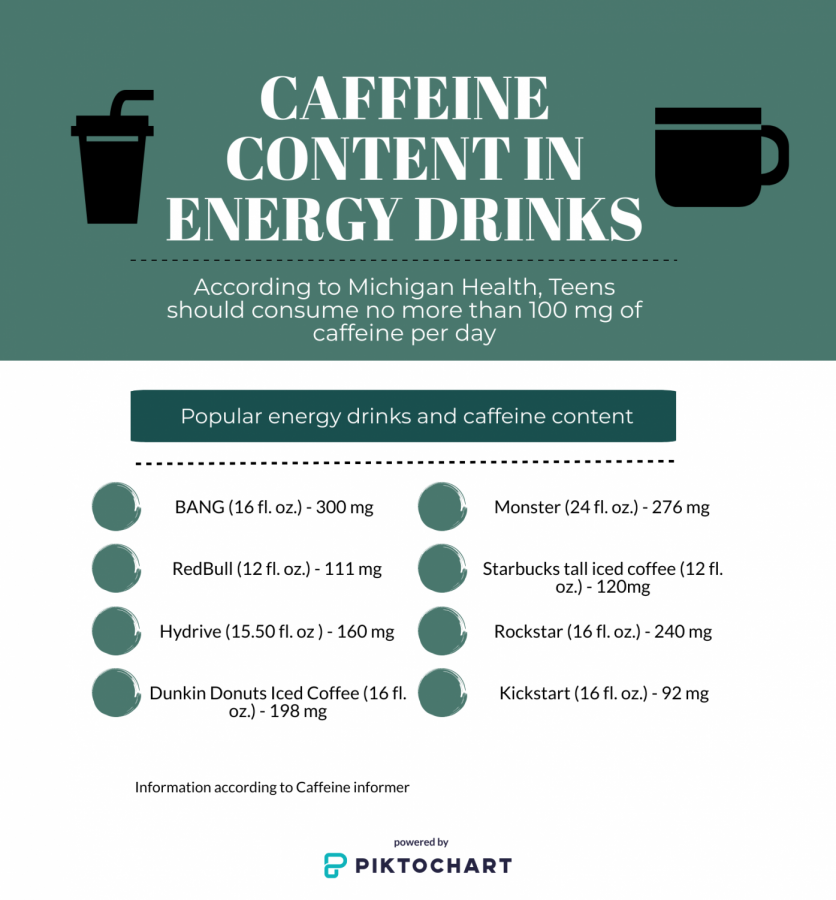The dangers of caffeine
Energy drinks becoming more popular leads to many issues
Infographic by Brenna Batchelder
The recommendation of caffeine for teens is 100 mg, unfortunately, many popular energy drinks go above this amount. Recognizing this is important to student’s health to ensure they don’t abuse caffeine.
March 5, 2020
While wandering the halls of any high school, they all have one thing in common: caffeinated drinks. Students everywhere rely on these liquid forms of temporary energy to get through their stressful school days.
According to Very Well Health, 73% of minors consume energy drinks regularly. Obviously, the consumption of caffeine is common in a huge portion of teenagers’ lives. Grabbing a coffee before school is common even in my life. Though caffeine might help students get through long and tiring days, there are countless negative impacts.
Students consume caffeinated drinks for many reasons. For the most part, teenagers drink them to gain energy, improve their focus and increase their alertness. Caffeine is a huge component of that. A study done by Harvard Health states that caffeine is a stimulant that targets your central nervous system. It speeds up your heart rate and causes you to feel energized. Caffeinated beverages appeal to teens for these reasons. Students typically drink them to make up for their lack of sleep and to keep themselves focused. As a student, it is completely understandable why buying a Redbull is easier than getting a full night’s rest.
Although energy drinks are an easy way to feel refreshed after a long night, there are many hidden dangers. According to Very Well Health, they cause many side effects such as insomnia, muscle twitching, gastrointestinal disturbances and stomach irritation. Most students ignore these side effects just for the temporary energy, but it has even more detrimental impacts on a teen’s health. Long-term caffeine consumption stunts brain development, cause the bones to lose calcium which results in osteoporosis and aggravates heart issues. In some cases, overconsumption of caffeine causes heart failure. Caffeine impacts your heart rhythm which is fatal in some cases. At the rate that teenagers are consuming caffeine, issues like these will become more and more common.
The massive amount of caffeine consumed leads to a dependency on energy drinks and coffee. Students abuse caffeine to the point where they can’t function without it. The Academy of Nutrition and Dietetics states that the number of teens drinking caffeine has tripled since the 1970s. Dependency on these drinks causes more to be consumed that results in spending more money on them. U.S News claims that teens consumed $16.3 billion worth of energy drinks in 2016, and it has only increased. On top of health issues, they can also break your wallet.
All in all, the consumption of caffeine within teens is very problematic. It leads to some major health issues and is quite expensive. Caffeine has its issues, but so does everything in large doses. Teenagers should work on limiting their caffeine intake within their diets to avoid health complications. Despite the ‘benefits’ of caffeine, it should be only used in moderation. Too much caffeine has detrimental help effects and eventually be fatal. So the next time you pick out an energy drink, reconsider the impacts.







